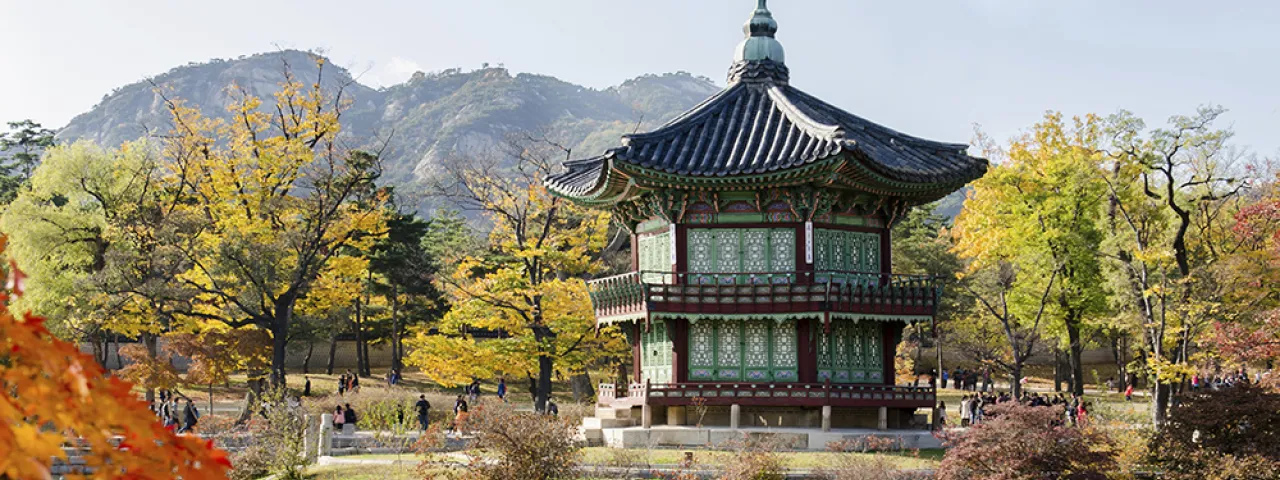
Buddhist Studies
A minor in Buddhist studies is an excellent adjunct to majors in such fields as religion, philosophy, American studies, anthropology, art history, Asian studies, comparative literature, East Asian languages and literature, East Asian studies, and the study of women and gender. It allows for a deeper focus in Buddhism, offering an interdisciplinary complement to your major as well as an important credential for graduate admissions.
Department Update
Learn more about the Buddhist Studies Program
Get a helpful snapshot of our program in our latest brochure.
Keep up-to-date
Stay informed about the latest news, events and opportunities in Buddhist studies by signing up for our email list. Contact Phoebe McKinnell for more information. You can also check out the Buddhist studies Facebook page for the latest information on events, photos and more.
Requirements & Courses
Buddhist Studies Minor
Requirements
- Required gateway: BUS 120
- Twenty-four additional credits from at least two disciplines, including anthropology, art history, literature, philosophy, religion and sociology, or others where appropriate, chosen in consultation with the minor adviser. Buddhist studies is interdisciplinary, and students must understand multiple approaches to the field in order to study it successfully.
- Students should study Buddhism as it is practiced in at least two of the following four geographical areas: South and Southeast Asia, East Asia, the Tibeto-Himalayan region, and the West. Buddhism is constituted differently in different cultures, and it is important to understand this diversity in order to make sense of Buddhism’s development and dissemination.
- The minor should comprise study of both classical and contemporary Buddhism. The Buddhist tradition cannot be understood without an appreciation of its rich history and evolution. Nevertheless, any understanding of Buddhism would be incomplete without a sense of its contemporary manifestations and role in world culture.
- No language study is required for the minor. A maximum of 8 credits towards the minor may be satisfied by the study of a language relevant to Buddhist studies (to be approved by the minor adviser). This language might be a canonical language, or a modern language that facilitates research in Buddhism. Buddhist studies relies on linguistic competence, and students who intend to pursue graduate studies in Buddhist studies are strongly encouraged to study languages. Credit for language will only be given for courses at the second-year level or above.
- At least 8 credits in the minor must be taken at Smith; up to 12 credits of overseas study may be counted. The minor requires one seminar addressing a topic in Buddhist studies.
Courses
The following courses can be counted in the Buddhist studies minor. There are also many Buddhism-related courses offered throughout the Five Colleges.
BUS 120 The Study of Buddhism (1 Credit)
This course introduces students to the academic study of Buddhism through readings, lectures, and discussions. Students explore the ways that Buddhism is analyzed and interpreted through the perspectives of different academic disciplines, including anthropology, art, environmental humanities, gender studies, government, literature, philosophy, and religion. Each week features a different methodological approach. Materials to be considered include discourses of the Buddha, meditation manuals, painting, poetry, philosophical treatises, and more. This course meets during the first half of the semester only. S/U only. Historical Studies
Fall
BUS 253 Indo-Tibetan Buddhist Philosophy and Hermeneutics (4 Credits)
This intensive course is taught at the Central University of Tibetan Studies in Sarnath, India, as part of the Tibetan Studies in India program. Students take daily classes, taught by eminent Tibetan scholars, in Buddhist philosophy, Indo-Tibetan hermeneutics, and Tibetan history and culture; they attend incidental lectures on topics including Tibetan art, astrology, history, medicine, and politics; and they participate in regular discussion sessions. Students also visit important Buddhist historical sites and explore Varanasi, home to thousands of Hindu temples. Each student is paired with a Tibetan student "buddy" to get an inside view of Tibetan culture. No prerequisites. Application and program acceptance required. This course takes place in India. Enrollment limited to 15. Instructor permission required. Natural Science; Social Science; Historical Studies
Interterm, Variable
BUS 400 Special Studies in Buddhist Studies (1-4 Credits)
Normally, Buddhist studies minors only. Instructor permission required.
Fall, Spring
Crosslisted Courses
ANT 274 The Anthropology of Religion (4 Credits)
What can anthropologists teach us about religion as a social phenomenon? This course traces significant anthropological approaches to the study of religion, asking what these approaches contribute to our understanding of religion in the contemporary world. Topics include religious experience and rationality; myth, ritual and magic; rites of passage; function and meaning; power and alienation; religion and politics. Readings are drawn from important texts in the history of anthropology and from contemporary ethnographies of religion. Social Science
Fall, Spring, Alternate Years
ARH 290mc Colloquium: Topics in Art History-Meditations in Caves (4 Credits)
The course is an introduction to Buddhist grottoes of East Asia. Students learn the historical trajectories of Buddhist grottoes, including the development of cave architecture, mural painting and sculpture. The course pays special attention to the site specificity of the visual imageries and their transmissions, commissions and functions. The case studies in this course range from the Kizil Caves and Mogao Caves in Northwestern China, to the Yungang Caves and Longmen Caves in the central plains and the Seokguram Caves in the Korean Peninsula. The course also considers the collecting, preserving and displaying of Buddhist grottoes in the contemporary world. Restrictions: ARH 290 may be taken for credit a total of 4 times with different topics. Enrollment limited to 20. Arts; Historical Studies
Fall, Spring, Variable
PHI 108/ REL 108 The Meaning of Life (4 Credits)
Offered as REL 108 and PHI 108. This course asks the big question, "What is the Meaning of Life?" and explores a range of answers offered by philosophers and religious thinkers from a host of different traditions in different eras of human history. It explores a variety of forms of philosophical and religious thinking and considers the ways in which philosophical and religious thinking can be directly relevant to students' lives. Historical Studies; Literature
Fall, Spring, Variable
PHI 127 Introduction to Indian Philosophy (4 Credits)
An introduction to the two-thousand-odd years of philosophy on the Indian subcontinent, focusing on central texts and topics: the nature of self, mind and reality; knowledge and its acquisition; morality and meaning; language and aesthetics. Students read selections of primary texts in translation, such as the Upanishads, the Bhagavad Gita, Milinda's Questions, the Nyaya Sutras and others. The course focuses on premodern Indian philosphy but includes some modern Indian thought, especially that which reflects on the relationship between modern and traditional ideas in the subcontinent. Historical Studies
Fall, Spring, Variable
PHI 234ts Topics in Philosophy of Human Nature-The Self (4 Credits)
This course explores a cluster of the most fundamental questions about human nature: What are we? Do we have core selves that determine our identity? If so, what is such a self, and how does it develop? Or might we be selfless? If we are selfless, what is the nature of our identities? What might the reality or unreality of the self mean for the nature of our experience, for ethics, or for what gives our lives meaning? These are questions that have been raised and addressed with great sophistication in both Indian and Western philosophical traditions and that have been explored empirically in cognitive psychology and by experimental philosophers. Our investigation will therefore be both cross-cultural and interdisciplinary. Social Science
Fall, Spring, Variable
PHI 252 Buddhist Philosophy: Madhyamaka and Yogacara (4 Credits)
This course examines the two principal schools of Indian Mahayana Buddhist philosophy. The Madhyamaka school is highly skeptical and critical in its dialectic. The Yogācāra or Cittamatra school is highly idealist. The two present contrasting interpretations of the thesis that phenomena are empty and contrasting interpretations of the relationship between conventional and ultimate reality. The debate between their respective proponents is among the most fertile in the history of Buddhist philosophy. Students read each school's principal sutras and early philosophical texts, medieval Tibetan and Chinese commentarial literature and recent scholarly discussions of the texts and doctrines of these schools. Prerequisites: one course in Philosophy or Buddhist Studies. Enrollment limited to 40. Historical Studies
Fall, Spring, Variable
PHI 253bb/ REL 253bb Topics in Indian Philosophy-Buddhists and Brahmins (4 Credits)
Offered as PHI 253bb and REL 253bb. Buddhists and Brahmanical thinkers were frequently philosophically at odds with each other in premodern India. They disagreed over what reality is and how it can be known as well as how one can think and talk about it. This course focuses on key debates between these groups in order to appreciate the range of positions within both Buddhist and Brahmanical philosophy. Discussions may include: whether there is a self or a God, what words refer to, what can be known through language, the relationship between language and inference. Prerequisite: One PHI course. Historical Studies
Fall, Spring, Variable
PHI 334as Seminar: Topics in Philosophy of the Mind-Consciousness and its Abnormal States (4 Credits)
This course examines the nature of consciousness, emphasizing the challenges abnormal states of the brain present for the understanding of consciousness. Questions raised include: What is consciousness and its nature? Can consciousness be shared between individuals? Can consciousness be divided within an individual? In answering these questions, students engage with leading theories of mind and self. This investigation is both intercultural and interdisciplinary, drawing from research in neurology, contemporary Western philosophy, and classical Asian philosophy (especially Buddhism, Yoga, Sāṃkhya, and Vedānta). Restrictions: Juniors and seniors only. Enrollment limited to 12. Instructor permission required. (E) Mathematics
Fall, Spring, Variable
REL 164 Buddhist Meditation (4 Credits)
This course explores classical and contemporary forms of Buddhist meditation theory and practice. It examines both classical formulations and contemporary expositions with an eye to seeing how the theory and practice of Buddhist meditation are being adapted to fit the needs of people today. Enrollment limited to 25. Historical Studies
Fall, Spring, Variable
REL 171 Contemporary Hinduism (4 Credits)
This course is an introduction to the ideas and practices of contemporary Hinduism in India, with an emphasis on how these traditions have shaped—and been shaped by—culture and politics. The class discusses various gods and goddesses, saints and shrines, rituals and ceremonies, radicals and reformers, as well as the ways Hinduism has engaged with inequality, caste and nationalism. Students consider philosophical writings, ritual texts, devotional poetry, comic books, legal treatises, feminist manifestos and personal memoirs, as well as ethnographic and popular films. This course has no prerequisites. Historical Studies; Literature
Fall, Spring, Variable
REL 270 Zen Buddhism and Japanese Culture (4 Credits)
The development of Buddhism and other religious traditions in Japan from prehistory through the 19th century. Topics include doctrinal development, church/state relations, and the diffusion of religious values in Japanese culture, particularly in the aesthetic realm (literature, gardens, tea, the martial arts, etc.) Historical Studies
Fall, Spring, Variable
REL 275 Religions of Ancient India (4 Credits)
This course is an introduction to the literature, thought and practice of religious traditions in India, from ancient times to the medieval period. Readings include materials from the Vedas, Upanishads and epics, from plays and poetry, as well as Buddhist and Jain literature. Particular consideration is given to the themes of dharma, karma, love and liberation as they are articulated in Classical Hinduism. Historical Studies
Fall, Spring, Variable
REL 280 South Asian Visual Culture (4 Credits)
How does one make sense of what one sees in South Asia? What is the visual logic behind the production and consumption of images, art, advertising and film? This course considers the visual world of South Asia, focusing on the religious dimensions of visuality. Discussions include the divine gaze in Hindu and Buddhist contexts, the role of god-posters in religious ritual and political struggle, the printed image as contested site for visualizing the nation and the social significance of clothing and commercial films in colonial and contemporary India. Students also work closely with holdings from the Smith College Art Museum.
Fall, Spring, Variable
Courses Outside of Smith
There are also many Buddhism-related courses offered throughout the Five Colleges. You can use the Five College Course Guide to find current offerings.
Two Wisdom Academy online courses are available to the Smith College community free of charge:
1. Smith College Professor Jay Garfield and Central Michigan University Professor Guy Newland recorded The Three Turnings of the Wheel of Dharma. The course, over 10 lessons, provides students with:
- a solid grounding in the core teachings of Buddhist philosophy
- an overview of important texts and philosophers from across Buddhist traditions
- a comprehensive, unified vision of the Buddha’s teachings
- an explanation of how ethics and metaphysics relate to each other
Smith College students, faculty and community members can log in here to access the Three Turnings course content free of charge.
2. Professor Jay Garfield recorded Buddhist Philosophy in Depth, Parts One, Two and Three, with each part comprised of 10 lessons. The course provides students with:
- the fundamentals of Buddhist philosophy across traditions
- familiarity with Buddhism’s greatest thinkers and writers
- how philosophy can be used to deepen Buddhist practice
- what constitutes Buddhist ethics, metaphysics, and philosophy of mind
- how the core teachings of the Buddha have evolved throughout history
- the famed teachings on emptiness or Madhyamaka, the philosophy of the Middle Way
- the influential Mind Only school of philosophy, or Yogācāra
- how Ancient Buddhist philosophers conceived of the mind and the phenomenal world, and how they debated their views
- how the influence and richness of Indian Buddhist philosophy helped spread the Buddha’s message throughout Asia
- how the synthesis of Madhyamaka and Yogācāra philosophy helped form the early Chinese schools, and Chan, as well as the significance of the kōan tradition in Chan
- how Buddhism was transmitted to Japan, and influenced by the famed Zen Master Eihei Dōgen
- how the traditions of sutra and tantra were transmitted to Tibet, and gave rise to the four major schools of Tibetan Buddhism, carrying on the Nalanda tradition of Indian Buddhist philosophy
- the distinctive features of the Buddhadharma’s transmission to the West
Smith College students, faculty and community members can log in here to access the Buddhist Philosophy in Depth course content free of charge.
Faculty
Affiliated Faculty
Faculty Seminar
The Five College Buddhist Studies faculty, along with interested scholars from other institutions in the area, meets three or four times each semester to discuss precirculated, in-progress work of seminar members or of invited scholars. See a list of recent seminars.
If you are interested in participating in our seminar, please send an email to Andy Rotman.
We have archived many Buddhist Studies lectures and events on YouTube.
Contact Buddhist Studies
Wright Hall 106
Smith College
Northampton, MA 01063







